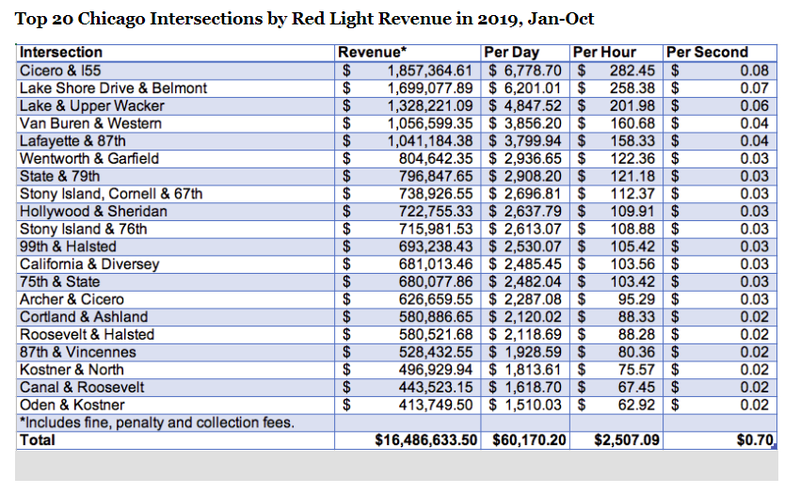Source: Zero Hedge
by Tyler Durden | Wed, 11/20/2019
It appears as though someone figured out that red light cameras could rack up tons more in fines if the number of times a light changes to red increases. This has led to nefariously shorter green lights in certain areas of Chicago.
Intersections where drivers are issued hundreds of thousands of dollars in tickets have been unfairly racked up, according to ABC's investigative reporting team. The team timed traffic lights at intersections where cameras were present and found that drivers had less time to legally get through intersections in directions where cameras where watching.
In once case, yellow and green lights were only 20 seconds - combined.
The city - which has been in a perpetual state of financial peril thanks to horrifying mismanagement of its pension liabilities - took in $35 million from the city's 300 red light cameras so far in 2019.
Kevin O'Malley, managing deputy commissioner of the Chicago Department of Transportation, said: "We believe it improves traffic safety which in the end saves injuries and saves lives."
But on a tip from a group opposing the cameras, the ABC team decided to conduct their own investigation. Mark Wallace of Citizens to Abolish Red Light Cameras (CARLC) said: "The question is why is a green light shorter where the red light camera is at the very same intersection."
Wallace continued: "That's really significant and you can just generate a lot more violations by having a shorter green on a red light."
The green lights are shorter at intersections where there are cameras. "It seems like they're definitely trying to get people out here," one driver said.
City records indicate that one light - at 87th and Lafayette in Chatham - generated more than $1 million this year. In the two directions with cameras, the green lights are 20 seconds and 29 seconds. The direction without a camera timed at 1 minute and 9 seconds - a major difference of up to 49 seconds longer.
O'Malley says the timing is "based on traffic flow" and not on the cameras. He says 20 seconds is enough time to keep traffic moving: "It should be enough time, for the traffic flow that is there at the time."
He says that lights have different times based on traffic patterns and that intersections chosen for cameras are due to their "history of known traffic crashes".
O'Malley continued, explaining why cameras were only installed in directions where the green lights were shorter: "These three intersections you've pointed out are off the Dan Ryan, and they happen to be parallel to the Dan Ryan, and one of the directions is on a bridge that goes over the expressway, and we don't install cameras on bridges because of the constructability. It's more difficult, as well as the a little shake, so the enforcement is a little more difficult."
Please go to Zero Hedge to read the entire article.
________
Illinois owes more than it owns. Illinois' Taxpayer Burden™ is -$52,600, and it received an "F" from TIA. Illinois is a Sinkhole State without enough assets to cover its debt. Illinois only has $28.9 billion of assets available to pay bills totaling $252.8 billion:
$203 BILLION AND COUNTING: TOTAL DEBT FOR STATE AND LOCAL RETIREMENT BENEFITS IN ILLINOIS
Kill rates in Chicago for 2019:
Hey Jackass!
Have a look at how the system in California has been pillaged. There is no way pension fund managers can possibly find a return on their investments to pay these pensions. The only way to continue these pensions is to continue raising taxes on California residents anyway the state bureaucrats can:
Nearly 80,000 California retirees are receiving $100,000 or more in pension pay, new data show
California DMV Rakes In $50 Million Per Year Selling Personal Information

No comments:
Post a Comment
Note: Only a member of this blog may post a comment.